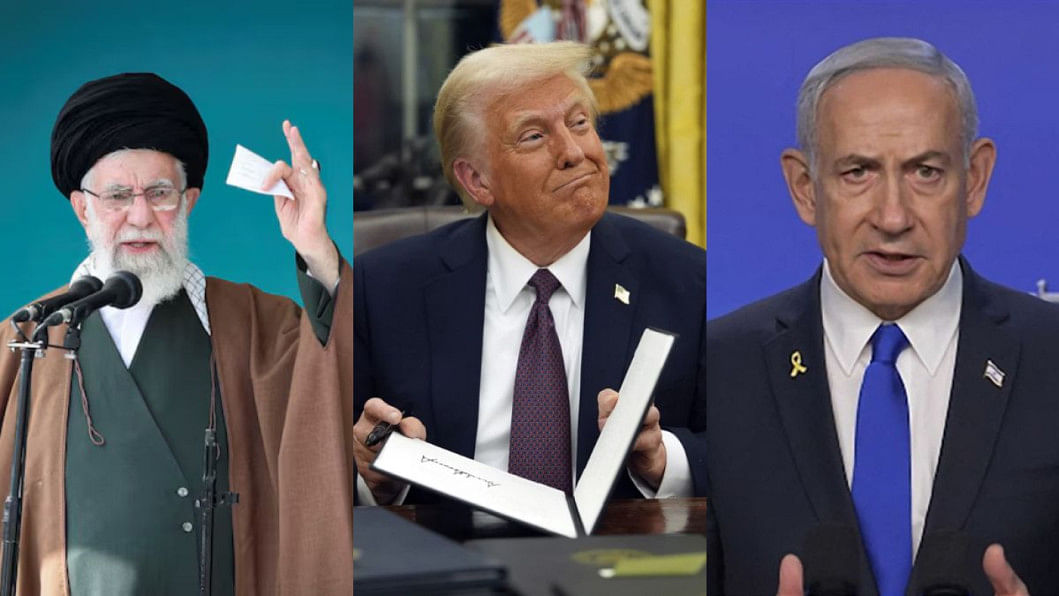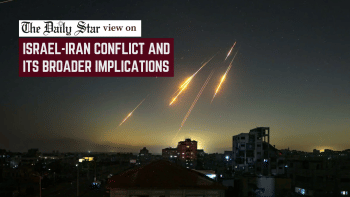Israel-Iran conflict: The outcome depends on the US

After a year-long shadow war, Israel directly bombarded Iran on Friday, June 13, hitting key nuclear and military sites and assassinating top figures. Iran, in turn, launched drones and ballistic missiles at Israel. Israeli strikes have allegedly killed 224 people so far, according to Iran's health ministry on June 15, 2025, while Iran's attacks have killed 24 people in Israel, including civilians, according to the BBC on June 16. Israeli Prime Minister Benjamin Netanyahu remains steadfast in continuing strikes on Iran for "as many days as it takes" to degrade Iran's nuclear programme and devastate its military. Iran's leader, Ayatollah Ali Khamenei, threatened "severe punishment" and claimed residential areas had been targeted. More bloodshed seems inevitable, but the outcome of the war, which is at a critical juncture, remains bleak.
On June 16, one Israeli source told CNN, "The end will be diplomatic, not military," adding that the Israeli hope is now that its ongoing military action "weakens Iran's negotiating hand" in any future nuclear talks. US President Donald Trump has openly said he intends to use the war that Israel started to bring Iran to the negotiating table. When asked by reporters at Axios whether Israel's attack jeopardises nuclear diplomacy talks between the US and Iran, Trump said, "I don't think so. Maybe the opposite. Maybe now they will negotiate seriously." He stated that he had given Iran 60 days, to which he claims Iran did not cooperate. Trump also mentioned that Israel had used "great American equipment" during the attacks.
On the other hand, Prime Minister Netanyahu said on June 15, "I leave the US position to the US. What are they going to do now? I leave it to President Trump. He made clear that Iran must not have a nuclear weapon." Netanyahu's intentions are clear—it is well documented that he has wanted to drag the US into a war with Iran under every US administration he has encountered in his career, even if it comes at the cost of Israeli civilian lives. Now, Netanyahu's success in his aim—as he puts it himself—as well as Iran's responses, depend heavily on Trump's next steps. It is worth noting that Trump has demonstrated miscalculations regarding the Russia-Ukraine war, by approaching Russian President Vladimir Putin directly, which did not lead to the "peace" that Trump had claimed it would. Still, it is plausible that the Israeli attacks could very well weaken Iran and bring it to the negotiating table for the US, as Trump would have it. But that logic of using Israel's war on Iran to "negotiate" with Iran contradicts itself, as Israel does not want successful diplomacy between the US and Iran. In other words, Trump's tactics could also backfire—significantly.
The confusion surrounding the scenarios ahead also arises from the US handling of the current conflict, which has been discordant, to say the least. The White House's messaging at first was Marco Rubio stating that the Israeli attack was a "unilateral action," and Trump claiming he preferred "the more friendly path" with Iran. It quickly shifted to Trump claiming on June 15,that they knew "everything about" the Israeli strikes as reported by Reuters. Meanwhile, Trump announced that he would be leaving the G7 summit in Canada earlier than planned to address the crisis in the Middle East, after issuing an ominous warning for Iranians to "immediately evacuate" Tehran. G7 leaders called for a resolution to the crisis in the Middle East in a joint statement on June 16,which an official familiar with the matter told CNN was signed with the support of US President Donald Trump, after language in the draft was adjusted to reiterate support for Israel's right to defend itself against its rival, Iran.
According to a report by NBC News on June 16, "over the past week, he [Trump] came to accept that Israel was determined to neutralise Iran's nuclear capabilities and that the United States would have to lend some military support for defensive purposes, as well as some intelligence support." Trump's change of heart—from negotiations to tacit support for Israel—also stemmed from "the Thursday declaration by the United Nations' watchdog, the International Atomic Energy Agency, that Iran was in breach of its non-proliferation requirements," the report states. Two US officials told NBC, "After the start of their military campaign, the Israelis collected intelligence that could have allowed them to target and kill Iran's supreme leader, Ayatollah Ali Khamenei. Netanyahu presented the operation to Trump, who opposed the plan altogether and wouldn't allow the United States to participate," as "No Americans had been killed in the conflict, so Trump didn't believe it would be appropriate to remove Khamenei, the political leader, and recommended against the Israelis conducting the operation."
The Trump administration's reasoning to not get involved in the Israeli government's risky operation in order to protect the US first does sheds hope that Trump might well be able to control the situation. But Netanayhu's relentless politics, entangling the US in a conflict for his own personal ambitions, complicates the situation. Analysts such as Stephen M Walt of Foreign Policy magazine have similarly speculated that Netanyahu's aim regarding Iran ranges from ending US negotiations with Iran, to dragging the US into a war, and at a maximum, weakening Iran to the point that the regime collapses.
The IAEA's report did not state that Iran had developed nuclear weapons. But Netanyahu justified his first attack on Iran, saying, "a nuclear weapon in a very short time—it could be a year, or it could be a few months." That justification is an unproven existential threat—a risk that Iran would "bomb someday"—and Israel's decision to attack appears to stem from the fact that an Iranian bomb would eventually limit Israel's ability to use force in the region with the impunity that it currently enjoys. As recently as March, US Director of National Intelligence Tulsi Gabbard testified that "Iran is not building a nuclear weapon" and said that Iranian Supreme Leader Ayatollah Ali Khamenei "has not authorised the nuclear weapons programme he suspended in 2003." Ultimately, Israel's plan to damage Iran severely depends on US cooperation, while the plan simultaneously risks blowing Iran-US diplomacy which is needed for regional and international security.
As attacks intensified on the premise of Iran's supposed imminent acquisition of a nuclear bomb, the IAEA's Director General Rafael Grossi said in an emergency session at the United Nations on June 16, "Military escalation threatens lives... and delays indispensable work towards a diplomatic solution for the long-term assurance that Iran does not acquire a nuclear weapon." Iranian Foreign Minister Abbas Araghchi has confirmed to Al Jazeera that the next round of Iran-US nuclear negotiations, which was scheduled for Sunday in Oman, has been cancelled. Tehran currently accuses the US of supporting Israel's attack. On June 14, Iran's semi-official Tasnim news agency quoted Ministry of Foreign Affairs spokesperson Esmaeil Baghaei as saying, "The other side [the US] acted in a way that makes dialogue meaningless. You cannot claim to negotiate and at the same time divide work by allowing the Zionist regime [Israel] to target Iran's territory."
As of June 16, Israel has said it has achieved "aerial superiority over Tehran's skies," but according to the IAEA, no damage has been observed near Iran's Fordow Fuel Enrichment Plant. Israel's ability to destroy Fordow remains under serious question. Israel's aerial superiority could mean repeated airstrikes on the same location to destroy Fordow, according to military analysts—reportedly the way that Israel destroyed Iranian-backed weapons production sites for Hezbollah in Syria last September, in the largest known Israeli operation in Syria. But Fordow is located under a mountain and is "much bigger, more secure" than the facility in Syria, so the "risks of failure are enormous," writes David E Rosenberg of Foreign Policy magazine. Research by the American Enterprise Institute's Critical Threats Project has reportedly shown that Israel's penetration of Fordow can only be achieved using the US-produced 15-tonne bunker-buster bomb, the GBU-57A/B Massive Ordnance Penetrator.
On the other hand, the status of Iran's stockpiles of enriched uranium—which it would need to feed into its centrifuges to produce weapons-grade uranium for bombs—is unknown. According to the IAEA, Israel targeted Esfahan nuclear facilities, including the Uranium Conversion Facility and the Fuel Plate Fabrication Plant, which Iran would require to produce more gas and enrich uranium. The killing of nuclear scientists, as well as the damage caused to its proxies in the region by Israel in the past year, also puts Iran in a weakened position.
But undeniably, Iran's trust in the US has eroded over the past week, and if the US does not impose restrictions on Israel's attack, Iran will have even fewer reasons to come to the negotiating table with the US. Amid the strikes, on June 15, it was reported that Iran is preparing a law to invoke the withdrawal provision from the Treaty on the Non-Proliferation of Nuclear Weapons (NPT)—the treaty that provides the key legal basis for the presence of international inspectors in Iran. With many possibilities for where the current conflict could head, uncertainty is widespread.
But what is certain is that US foreign policy—succumbing to Israel's smokescreen of using nuclear threats to dismantle Iran's regime—will open a new era of unprecedented rivalry between the US and Iran, the repercussions of which will ripple across the world.
Ramisa Rob is Geopolitical Insights Editor at The Daily Star.
Views expressed in this article are the author's own.
Follow The Daily Star Opinion on Facebook for the latest opinions, commentaries and analyses by experts and professionals. To contribute your article or letter to The Daily Star Opinion, see our guidelines for submission.


 For all latest news, follow The Daily Star's Google News channel.
For all latest news, follow The Daily Star's Google News channel. 





Comments